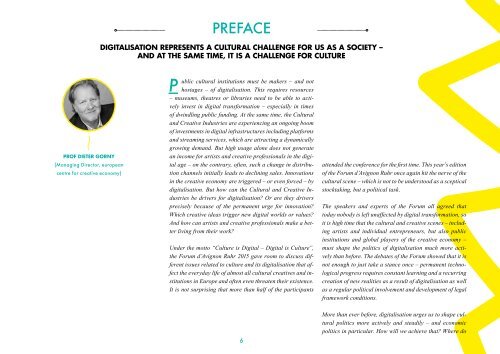DIGITAL IST KULTUR CULTURE IS DIGITAL – DIGITAL IS CULTURE
1n3RpM7
1n3RpM7
Erfolgreiche ePaper selbst erstellen
Machen Sie aus Ihren PDF Publikationen ein blätterbares Flipbook mit unserer einzigartigen Google optimierten e-Paper Software.
PREFACE<br />
<strong>DIGITAL</strong><strong>IS</strong>ATION REPRESENTS A CULTURAL CHALLENGE FOR US AS A SOCIETY <strong>–</strong><br />
AND AT THE SAME TIME, IT <strong>IS</strong> A CHALLENGE FOR <strong>CULTURE</strong><br />
PROF DIETER GORNY<br />
(Managing Director, european<br />
centre for creative economy)<br />
P<br />
ublic cultural institutions must be makers <strong>–</strong> and not<br />
hostages <strong>–</strong> of digitalisation. This requires resources<br />
<strong>–</strong> museums, theatres or libraries need to be able to actively<br />
invest in digital transformation <strong>–</strong> especially in times<br />
of dwindling public funding. At the same time, the Cultural<br />
and Creative Industries are experiencing an ongoing boom<br />
of investments in digital infrastructures including platforms<br />
and streaming services, which are attracting a dynamically<br />
growing demand. But high usage alone does not generate<br />
an income for artists and creative professionals in the digital<br />
age <strong>–</strong> on the contrary, often, such a change in distribution<br />
channels initially leads to declining sales. Innovations<br />
in the creative economy are triggered <strong>–</strong> or even forced <strong>–</strong> by<br />
digitalisation. But how can the Cultural and Creative Industries<br />
be drivers for digitalisation? Or are they drivers<br />
precisely because of the permanent urge for innovation?<br />
Which creative ideas trigger new digital worlds or values?<br />
And how can artists and creative professionals make a better<br />
living from their work?<br />
Under the motto “Culture is Digital <strong>–</strong> Digital is Culture”,<br />
the Forum d’Avignon Ruhr 2015 gave room to discuss different<br />
issues related to culture and its digitalisation that affect<br />
the everyday life of almost all cultural creatives and institutions<br />
in Europe and often even threaten their existence.<br />
It is not surprising that more than half of the participants<br />
attended the conference for the first time. This year’s edition<br />
of the Forum d’Avignon Ruhr once again hit the nerve of the<br />
cultural scene <strong>–</strong> which is not to be understood as a sceptical<br />
stocktaking, but a political task.<br />
The speakers and experts of the Forum all agreed that<br />
today nobody is left unaffected by digital transformation, so<br />
it is high time that the cultural and creative scenes <strong>–</strong> including<br />
artists and individual entrepreneurs, but also public<br />
institutions and global players of the creative economy <strong>–</strong><br />
must shape the politics of digitalisation much more actively<br />
than before. The debates of the Forum showed that it is<br />
not enough to just take a stance once <strong>–</strong> permanent technological<br />
progress requires constant learning and a recurring<br />
creation of new realities as a result of digitalisation as well<br />
as a regular political involvement and development of legal<br />
framework conditions.<br />
6<br />
More than ever before, digitalisation urges us to shape cultural<br />
politics more actively and steadily <strong>–</strong> and economic<br />
politics in particular. How will we achieve that? Where do


